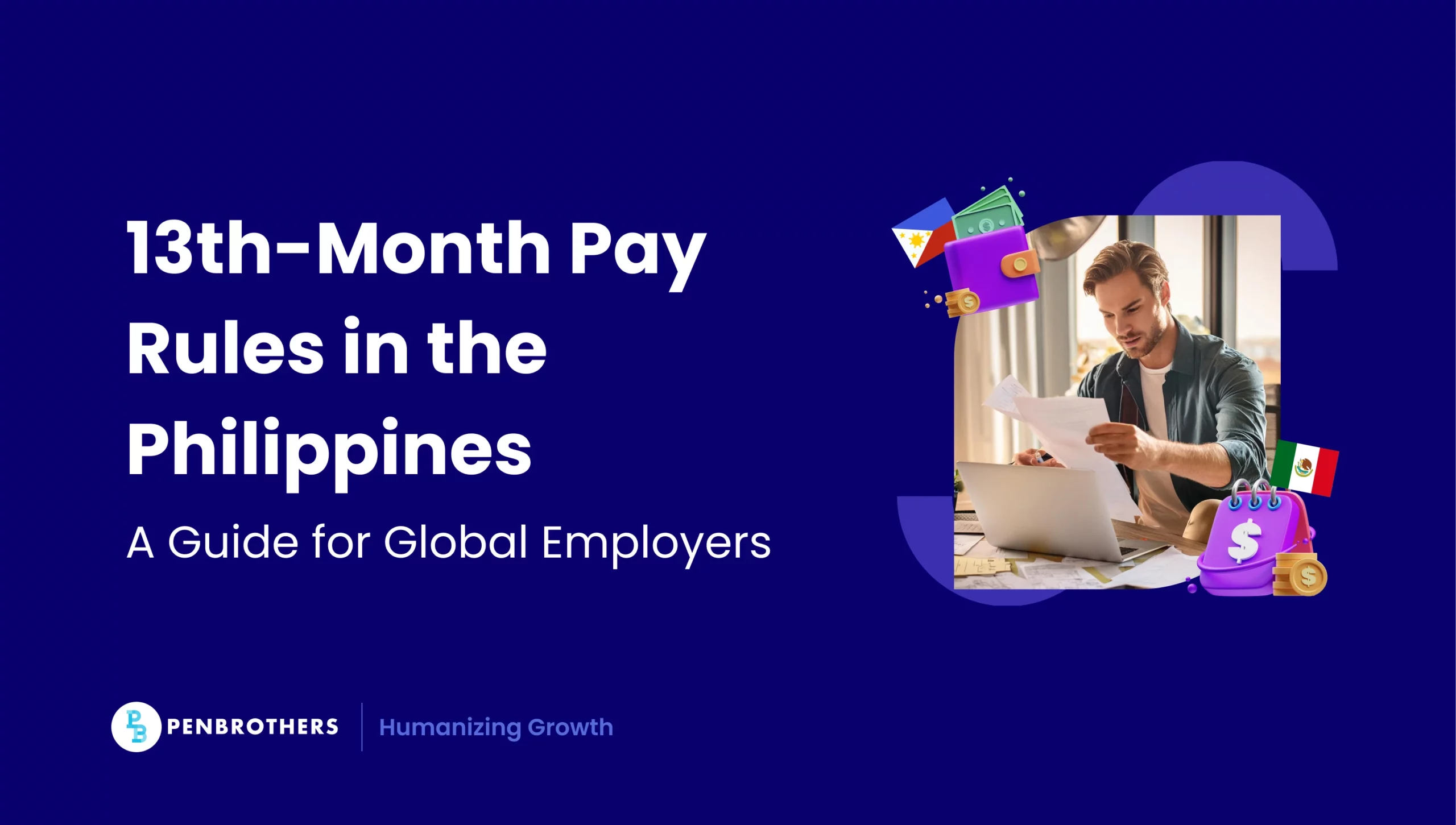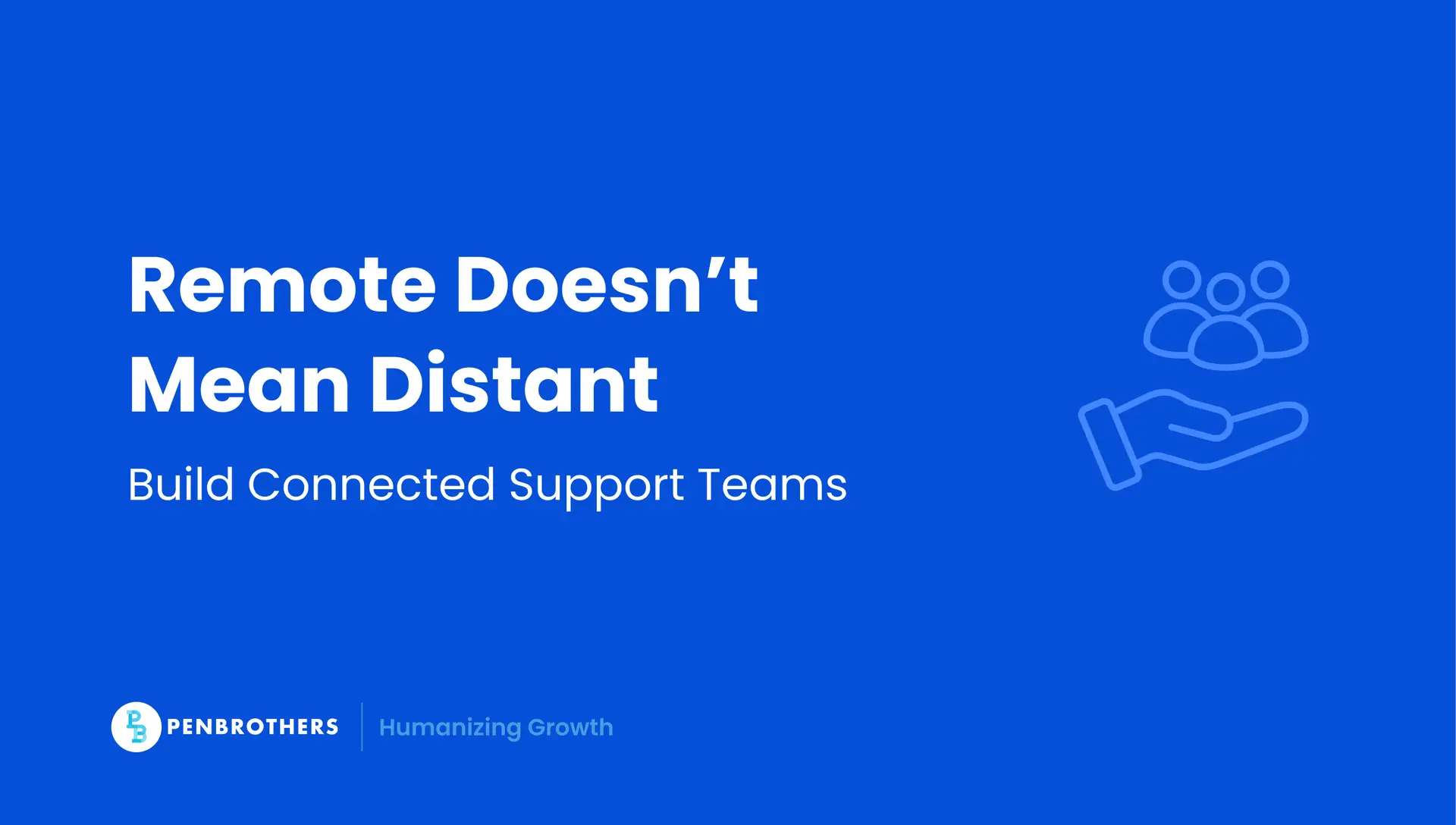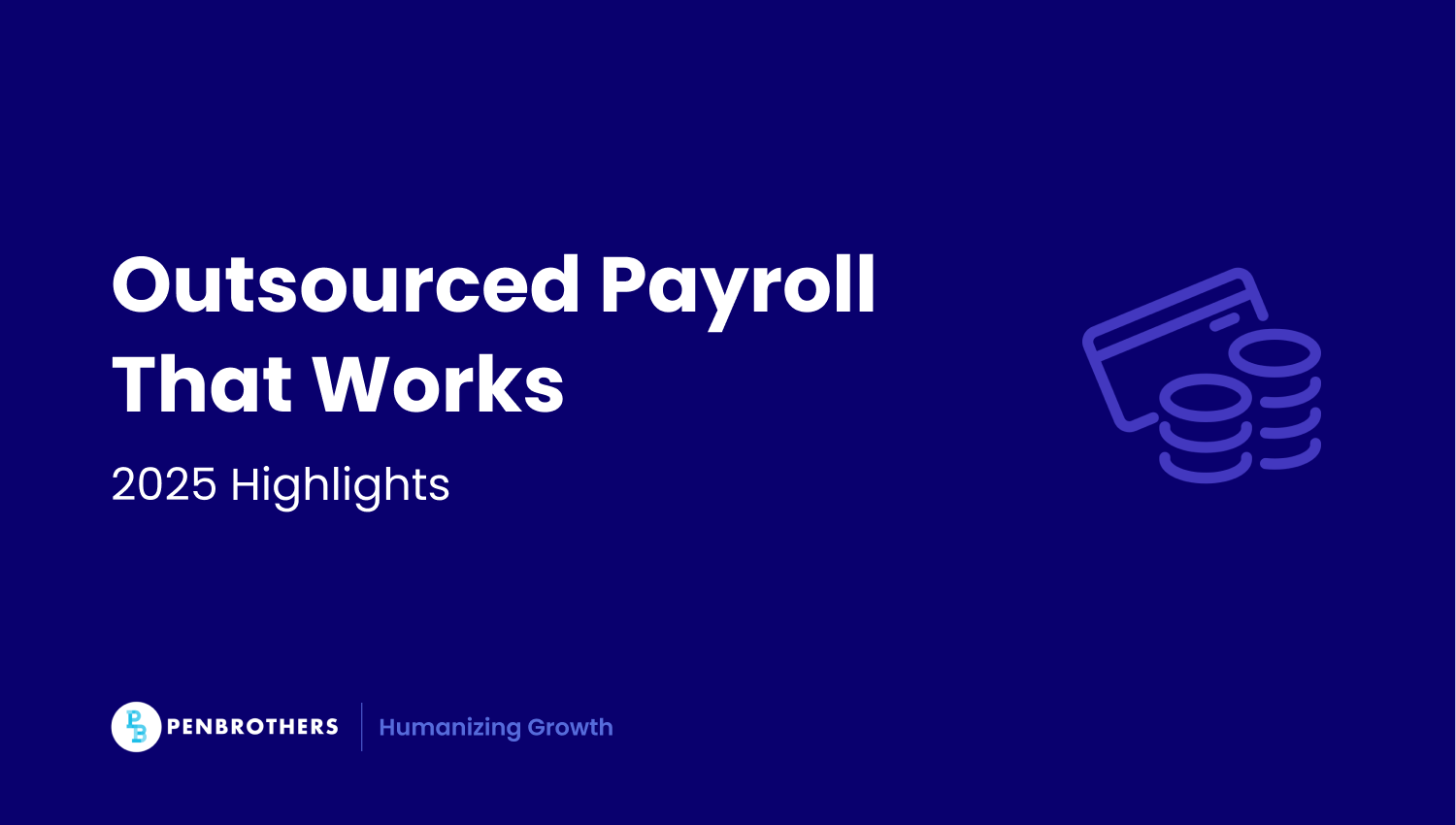What's Inside?
13th Month Pay in the Philippines: Essential Guide for Remote Work Compliance

The rise of global teams has unlocked incredible opportunities. For foreign companies, the Philippines offers a deep pool of skilled, English-proficient talent. For Filipinos, remote work provides access to global careers without leaving home. Yet, in this new world of work, a critical question often arises: What is the legal relationship between a foreign employer and a remote Filipino employee, and what does that mean for mandatory benefits like the 13th-month pay?
This question has become a source of anxiety for employees and a significant legal risk for employers. This guide is designed to remove that ambiguity. It is a strategic handbook for both parties, anchored in a simple truth: compliance is the cornerstone of a successful and sustainable offshoring partnership.
Key Takeaways
- A Mandatory and Legally Protected Benefit, Not a Bonus: 13th-month pay is not a discretionary bonus; it is a legally mandated benefit in the Philippines under Presidential Decree 851. Employers are required by law to pay it to all eligible rank-and-file employees.
- Eligibility Depends on Employee Classification, Not Contract Labels: The single most important factor determining eligibility is whether a worker is classified as an employee or a true independent contractor. If an employer exercises significant control over how the work is done, the worker is likely considered an employee and is entitled to the benefit, regardless of their contract’s title.
- The Calculation is a Clear, Prorated Formula: The amount of the benefit is calculated as one-twelfth (1/12) of the total basic salary an employee has earned during the calendar year. This formula is prorated, meaning employees who have worked for less than a full year are still entitled to a proportional amount based on their months of service.
- Compliance is Critical, Especially for Foreign Employers: Foreign companies with remote Filipino employees are still subject to Philippine labor laws if a true employer-employee relationship exists. Failure to pay the 13th-month pay by the December 24th deadline can lead to legal penalties from the Department of Labor and Employment (DOLE) and significant reputational damage.
What is 13th Month Pay?
In the Philippines, 13th-month pay is enshrined in law via P.D. 851. It is not considered a discretionary reward but a mandatory payment equal to one-twelfth of an employee’s yearly basic salary.
For Employers: Why Compliance is Your Competitive Advantage
The most common and costly mistake I’ve seen foreign employers make is assuming that a lack of physical presence in the Philippines exempts them from local labor laws. The truth is, if you have an employer-employee relationship with a Filipino worker, you are subject to the same legal obligations as a local company. Ignoring this can lead to:
- Legal & Financial Penalties: The Department of Labor and Employment (DOLE) can impose fines and penalties.
- Reputational Damage: Word travels fast. Mismanagement of pay and benefits can harm your brand’s reputation, making it difficult to attract future talent.
- Talent Attrition: Since many Filipino workers account for the 13th-month pay in their annual budgeting, it becomes a factor in attrition trends.
For Employees: Why This Pay is a Protected Right
You are entitled to 13th-month pay by law, not because it’s an employer’s favor. It is a fundamental part of your compensation, and it applies regardless of your employer’s location. The law is designed to protect you, and knowing your rights is the first step toward a secure and transparent remote work experience.
The Critical Distinction: Employee vs. Independent Contractor
The single most important factor in determining 13th-month pay eligibility is the worker’s classification. The Philippines, like many countries, uses what’s known as the Four-Fold Test to determine if a worker is an employee or an independent contractor.
The Power of Control is the most crucial element in this test.
- Employee: The employer manages the outcome and determines the way the work should be performed.
- Independent Contractor: The worker is hired for a specific result and has the freedom to determine their own schedule, methods, and tools. They are typically experts hired for a specific project, not ongoing, direct work.
For Employers: Mitigating the Risk of Misclassification
Before you hire, you need to be certain of your worker’s classification. Misclassifying an employee as an independent contractor to avoid benefits can lead to retroactive claims for unpaid benefits, including the 13th-month pay, back wages, and damages.
For Employees: How to Know Your Status
Your job title on a contract may not always reflect your legal status. If your employer dictates your work hours, provides your laptop, or directly supervises your daily tasks, you may legally be considered an employee and are likely entitled to the 13th-month pay.
Is It Illegal Not to Give 13th Month Pay?
Yes. Failing to provide 13th-month pay violates Presidential Decree 851 and can result in DOLE penalties, back pay orders, and legal damages.
Employers cannot avoid this obligation by calling workers “contractors” while treating them as employees. The actual working relationship determines legal status, not contract labels.
DOLE can impose fines, order immediate payment with interest, and pursue additional penalties for willful violations. Employees can file complaints up to three years after the violation occurred.
The Employer’s Handbook: Obligations & Best Practices
As an employer, a compliant and people-centric approach is non-negotiable.
Compliance Checklist for 13th-Month Pay
- Deadline: Payment must be made on or before December 24 of each year.
- DOLE Reporting: An annual compliance report must be submitted to the DOLE by January 15 of the following year.
- Payment Method: Be aware that a bonus can only substitute the 13th-month pay if its amount is equal to or greater than the statutory calculation.
How Do You Compute the 13th Month Pay?
The Philippines’ Department of Labor and Employment has a set of guidelines for computing 13th-month pay. The formula for a 13th-month pay calculator is this:
Total Basic Salary Received for the Year ➗ 12 Months = 13th Month Pay
You can also apply this formula to employees who started working with you later in the year.
Let’s say you have an employee with a monthly salary of PHP 30,000 or around USD 511. They started working with you in September. That means they worked with you for around three months. In that case, you can compute their 13th-month salary like this:
PHP 30,000 × 3 (Number of Months Worked in the Year) = PHP 90,000 (Total Basic Salary Received for the Year)
PHP 90,000 ➗ 12 Months = PHP 7,500
In this case, the 13th-month pay they’re entitled to would be PHP 7,500.
Check also: You can use this formula to calculate the salary costs of offshore employees as part of your offshoring strategy.
Can I Still Get My 13th-month Month Pay if I Resign in November?
Yes. You’re entitled to prorated 13th-month pay even if you resign before December. The law requires payment within 30 days of your resignation, not at year-end.
Your 13th-month pay calculation remains the same: total basic salary received divided by 12. If you worked January through November, you’d receive 11/12ths of your monthly basic salary.
Some employers mistakenly believe resignation forfeits this benefit, but Philippine labor law protects workers from this practice. Your final pay should include your prorated 13th-month pay, regardless of when you leave.
The Employee’s Guide: Rights & Resolution
Your 13th-month pay is a significant benefit. Here’s how to ensure you receive what you’re owed.
Verifying Your Pay: A Self-Audit
The formula above empowers you to double-check your pay. Be mindful of special circumstances like being hired mid-year or having unpaid leave, as these can affect the final amount.
In Case of Non-Compliance: A Guide to Action
If you believe your 13th-month pay is incorrect or unpaid, the proper channels are:
- Start with communication. Approach your employer first to clarify the issue.
- Contact DOLE. When no agreement is reached, filing a complaint with DOLE or the NLRC is an option. Claims for unpaid monetary entitlements must be made within three years.
Are Absences Deducted From 13th Month Pay?
Only unpaid absences affect your 13th-month pay calculation. Since the formula uses “total basic salary received,” periods without pay naturally reduce the total amount.
Paid leaves (vacation, sick leave) don’t impact your 13th-month pay because you received your basic salary during these periods. However, leaves without pay, suspensions, or other unpaid absences will proportionally reduce your entitlement.
The key distinction: if you received your basic salary, it counts toward your 13th-month pay calculation. If not, it doesn’t.
The Partnership Approach: The True Measure of an Offshoring Strategy
Ultimately, the most successful and ethical offshoring arrangements are built on a foundation of mutual trust. For employers, providing the 13th-month pay isn’t just about avoiding a penalty. It’s about demonstrating a long-term commitment to your team’s well-being and respecting the local culture. For employees, knowing your rights fosters confidence and makes you a more dedicated, committed partner.
At Penbrothers, our expertise lies in navigating this complex landscape for you. We provide end-to-end HR and compliance solutions that handle the entire process from accurate payroll and tax remittances to local legal frameworks. We exist to make this partnership work, ensuring that foreign employers can focus on their core business while their Filipino teams feel secure, valued, and empowered.
Frequently Asked Questions
13th-month pay is a legally mandated benefit for employees that is equivalent to 1/12th of the total basic salary an employee earned during the calendar year. It is a form of required compensation, not a discretionary bonus, and must be paid on or before December 24th.
No. Only workers who are classified as employees are entitled to 13th-month pay. True independent contractors, who are self-employed and are not subject to the direct control of a company regarding how their work is performed, are not eligible for this benefit.
The formula is the total basic salary an employee received during the year, divided by 12. If an employee has worked for less than a full year, the calculation is prorated based on the number of months they have rendered service.
Yes. Employees who resign at any point during the year are legally entitled to their prorated 13th-month pay. The amount should be calculated based on the total basic salary they earned during the year up until their resignation date, and it should be included as part of their final pay.
Yes. Because the calculation is based on the “total basic salary received” during the year, any unpaid absences or leaves without pay will reduce the total amount of basic salary you earned. This, in turn, will proportionally lower the final amount of your 13th-month pay. Paid leaves do not affect the calculation.
This content is AI-assisted, fine-tuned by a human content editor, and verified by a human subject matter expert.





